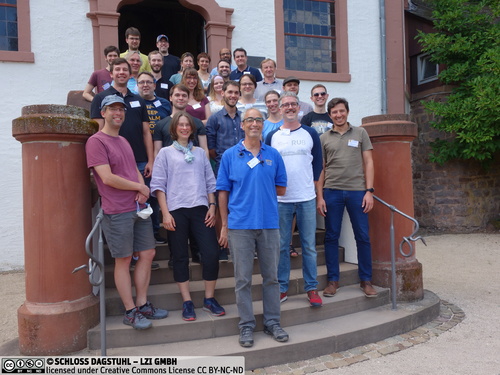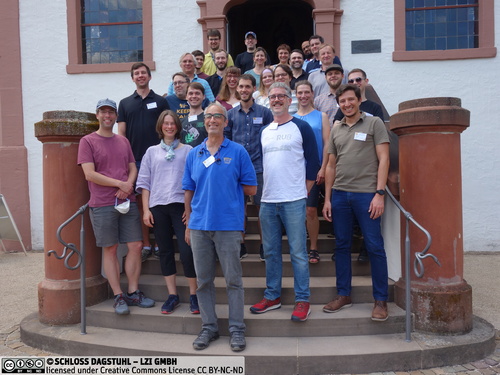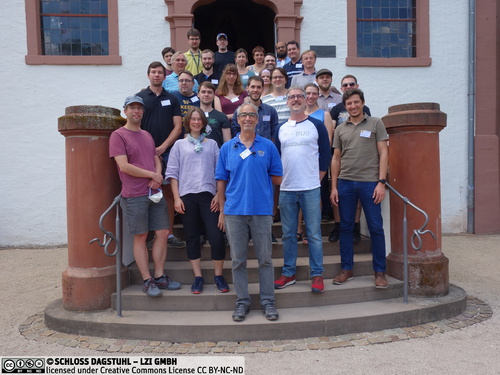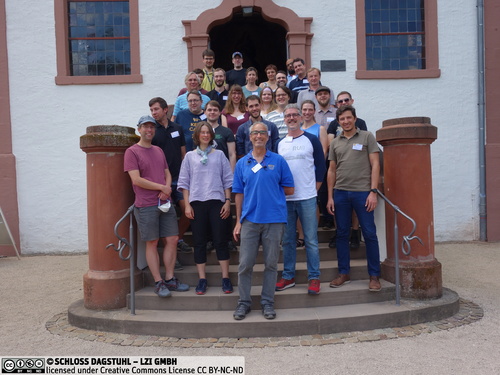Dagstuhl Seminar 22341
Power and Energy-Aware Computing on Heterogeneous Systems (PEACHES)
( Aug 21 – Aug 26, 2022 )
Permalink
Organizers
- Julian De Hoog (The University of Melbourne, AU)
- Kerstin I. Eder (University of Bristol, GB)
- Timo Hönig (Ruhr-Universität Bochum, DE)
- Daniel Mosse (University of Pittsburgh, US)
Coordinator
- Max Plauth (Hasso-Plattner-Institut, Universität Potsdam, DE)
Contact
- Marsha Kleinbauer (for scientific matters)
- Simone Schilke (for administrative matters)
Impacts
- Does rate adaptation at daily timescales make sense? : article in HotCarbon '23: Proceedings of the 2nd Workshop on Sustainable Computer Systems - Jacob, Romain; Lim, Jackie; Vanbever, Laurent - New York : ACM, 2023. - 7 pp..
- Work in progress: Towards a statistical worst-case energy consumption model : article in 2023 IEEE 29th Real-Time and Embedded Technology and Applications Symposium (RTAS) - Wehaiba El Khazen, Marwan; Ben Amor, Slim; Kougblenou, Kossivi; Gogonel, Adriana; Cucu-Grosjean, Liliana - Los Alamitos : IEEE, 2023. - pp. 333-336.
Schedule
More than ever, emissions, carbon footprint, and other related environmental concerns are at the forefront of society, from several different perspectives. There is an urgent need to understand how computing fits into the broader picture of our planet's energy consumption and what is the role of computing in reducing our carbon footprint worldwide. This requires new ways of thinking across different domains, and necessitates highly energy-efficient hardware and software designs that adapt to changing operating conditions to become more efficient. Collaboration is increasingly required across the entire system stack -- from system designers to programmers and operators.
The Dagstuhl Seminar 22341 on Power and Energy-Aware Computing on Heterogeneous Systems (PEACHES) brought together experts from computer science and computer engineering that share a common vision towards reducing carbon emissions both using innovative designs for computing systems and techniques that bridge the gap between hardware and software, as well as using computing systems to manage other environment-influencing systems. Five principal topic areas were discussed in working groups during the meeting: Energy transparency from hardware to software, Energy optimisation and management, Sustainability in computing, "Green Computing" hackathons, and Disruptive paradigms.
This report documents the program and the outcomes of PEACHES.
 Kerstin I. Eder, Timo Hönig, Daniel Mosse, and Max Plauth
Kerstin I. Eder, Timo Hönig, Daniel Mosse, and Max Plauth
There is an urgent need to understand how computing fits into the broader picture of our energy consumption, and what role there is for computing to reduce our carbon footprint and help to accelerate the transition to renewables. This requires new ways of thinking across different domains, and highly energy-efficient hardware and software designs that adapt to changing operating conditions. Collaboration is increasingly required across the entire system stack – from system designers to programmers and operators. This Dagstuhl Seminar aims to bring together experts from computer science and computer engineering that share a common vision for power and energy efficient computing. Five principal topic areas will be discussed:
- Energy Transparency from Hardware to Software
- How can we extend existing energy modelling to larger systems, including the cost of communication and consideration of computational diversity?
- How can we model, analyse and forecast the energy consumption of a given workload (and at what granularity) before it is actually run?
- Energy Optimisation and Management
- How can we optimally allocate tasks to hardware using an understanding of the energy consumption of different tasks on heterogeneous types of hardware?
- How can energy-optimal computing be achieved automatically through energy-aware toolchains?
- Computing for Sustainability
- How do we measure the carbon footprint of an application or process? Do we need new metrics?
- How can we model and forecast the carbon intensity of energy generation at different locations where a workload may be run?
- Saving Joules: “Green computing” Hackathons
- How can you save energy, i.e., what are the necessary methods, techniques, and tools?
- What are the pre-requisites to use the identified methods, techniques, and tools?
- What is the scope of the technique and does it transfer to other platforms/environments?
- What are the limits of the technique?
- Disruptive Paradigms
- How can we adapt to power-modulated computing (e.g., availability of renewable energies, energy harvesting)?
- How can we exploit new hardware capabilities (e.g., non-volatile memories) for novel energy-efficient systems architectures?
The seminar aims to (i) identify the intellectual challenges to significantly lower the energy consumed by computing, (ii) create new cross-domain collaborations to address these challenges, and (iii) generate new knowledge and understanding of how computational processes may interact to reduce the carbon footprint of computing.
 Julian De Hoog, Kerstin I. Eder, Timo Hönig, and Daniel Mosse
Julian De Hoog, Kerstin I. Eder, Timo Hönig, and Daniel Mosse
- Ahmed Ali-Eldin Hassan (Chalmers University of Technology - Göteborg, SE)
- Antonio Carlos Schneider Beck Filho (Federal University of Rio Grande do Sul, BR) [dblp]
- Ruzanna Chitchyan (University of Bristol, GB) [dblp]
- Liliana Cucu-Grosjean (INRIA - Paris, FR) [dblp]
- Kerstin I. Eder (University of Bristol, GB) [dblp]
- Michael Engel (Universität Bamberg, DE)
- Mathias Gottschlag (KIT - Karlsruher Institut für Technologie, DE) [dblp]
- Daniel Gruss (TU Graz, AT) [dblp]
- Benedict Herzog (Ruhr-Universität Bochum, DE) [dblp]
- Henry Hoffmann (University of Chicago, US) [dblp]
- Henriette Hofmeier (Ruhr-Universität Bochum, DE) [dblp]
- Timo Hönig (Ruhr-Universität Bochum, DE) [dblp]
- Romain Jacob (ETH Zürich, CH) [dblp]
- Alex Jones (University of Pittsburgh, US) [dblp]
- Fiodar Kazhamiaka (Stanford University, US) [dblp]
- Maja Hanne Kirkeby (Roskilde University, DK) [dblp]
- Sven Köhler (Hasso-Plattner-Institut, Universität Potsdam, DE) [dblp]
- Laércio Lima Pilla (University of Bordeaux, FR) [dblp]
- Daniel Mosse (University of Pittsburgh, US) [dblp]
- Frank Mueller (North Carolina State University - Raleigh, US) [dblp]
- Simon Peter (University of Washington - Seattle, US) [dblp]
- Max Plauth (Hasso-Plattner-Institut, Universität Potsdam, DE) [dblp]
- George Porter (University of California - San Diego, US) [dblp]
- Andreas Schmidt (Universität des Saarlandes - Saarbrücken, DE) [dblp]
- Wolfgang Schröder-Preikschat (Universität Erlangen-Nürnberg, DE) [dblp]
- Sibylle Schupp (TU Hamburg, DE) [dblp]
- Jennifer Switzer (University of California - San Diego, US) [dblp]
- Lukas Wenzel (Hasso-Plattner-Institut, Universität Potsdam, DE) [dblp]
- Samuel Xavier-de-Souza (Federal University of Rio Grande do Norte, BR) [dblp]
- Julian De Hoog (The University of Melbourne, AU) [dblp]
- Christian Eichler (Ruhr-Universität Bochum, DE) [dblp]
- Julia Lawall (INRIA - Paris, FR) [dblp]
- Tulika Mitra (National University of Singapore, SG) [dblp]
- Gunnar Schomaker (Universität Paderborn, DE) [dblp]
- Devesh Tiwari (Northeastern University - Boston, US) [dblp]
Related Seminars
- Dagstuhl Seminar 24351: Power, Energy, and Carbon-Aware Computing on Heterogeneous Systems (PEACHES) (2024-08-25 - 2024-08-30) (Details)
Classification
- Computers and Society
- Emerging Technologies
- Systems and Control
Keywords
- power
- energy
- heterogeneous computing
- systems
- operating systems





 Creative Commons BY 4.0
Creative Commons BY 4.0
